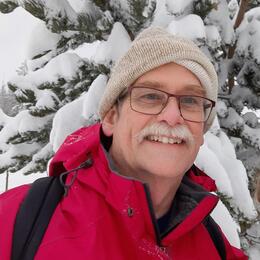Scott.Andrews@audubon.org
360-854-8526
Scott Andrews has a Masters in Watershed Management / Forestry and a law degree. He worked for 19 years for the Swinomish Tribe as Environmental Compliance Manager including air quality, hazardous waste and oil spill response, shoreline management climate change, environmental regulation and permitting. Scott has also worked for environmental organizations, including as Director of the Kansas Chapter of the Sierra Club, state agencies and the Nebraska Legislature. Scott lives, works and plays on the ceded lands of the Coast Salish Peoples. He enjoys hiking in the Cascades and birding in the Skagit Valley, especially in the months when it is home to incredible flocks of wintering waterfowl and shorebirds. To feed his creative urge he does occasional Shakespearean acting and writes theatrical plays. Scott is excited to work for Audubon and have the opportunity and responsibility to help defend the birds and habitats of this magnificent place where we live.
Coastal Estuaries
July 21, 2023
— Are large, woody debris (LWD) the best way to enhance the critical habitat at Kennedy Creek?
AuduBlog
May 18, 2023
— After the passage of HB 1181, updates to the Growth Management Act and new conservation guidelines will go into effect in eight years. But we can act faster.
AuduBlog
April 19, 2023
— Addressing erosion concerns for one of the largest concentrations of wintering shorebirds and waterfowl in south Puget Sound
Coastal Estuaries
February 17, 2023
— Visit our second birding open house in South Puget Sound on March 25, 2023 at Kennedy Creek estuary
AuduBlog
September 21, 2022
— An influx of dollars from the Infrastructure Investment and Jobs Act is a rare opportunity for conservation
Press Center
August 17, 2022
— New study shows that 74% of the armoring installed in San Juan County over a 10-year period had no permits from either the state or the county, and only 9% of the new armor in the county was legally permitted prior to installation
Press Center
June 22, 2022
— Shoreline armoring harms natural beaches that provide spawning habitat for forage fish, a key to Puget Sound's ecosystem
